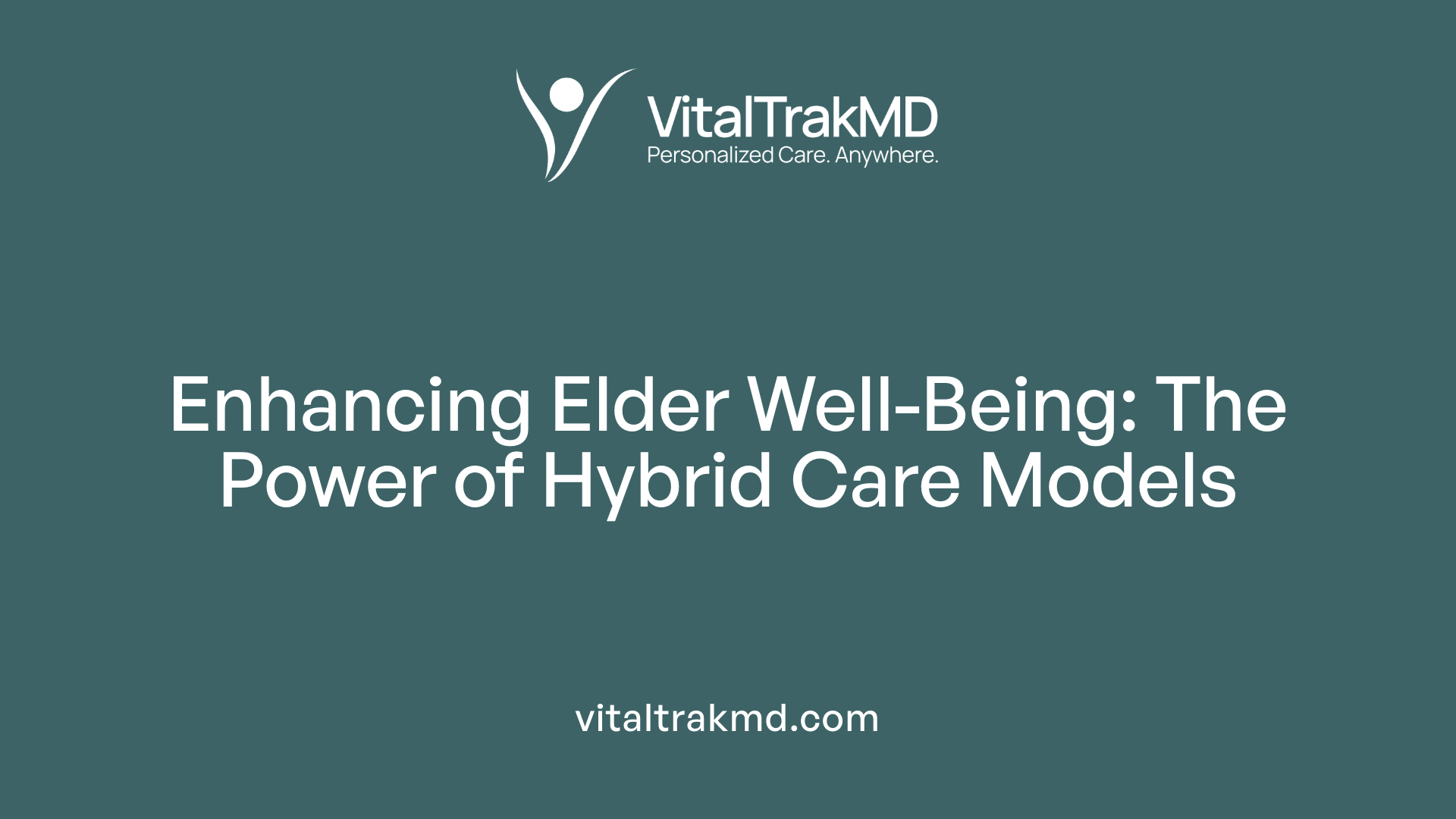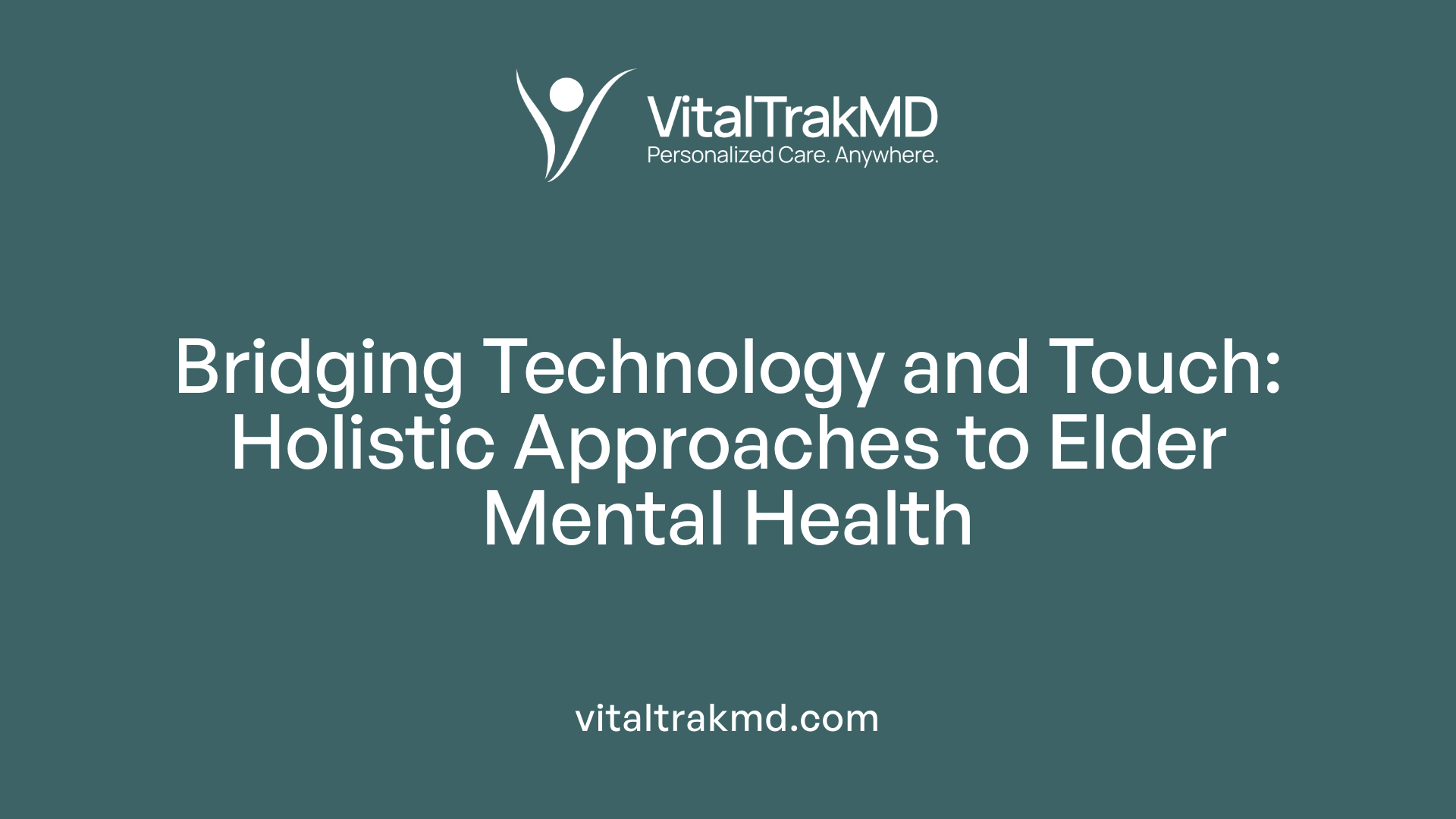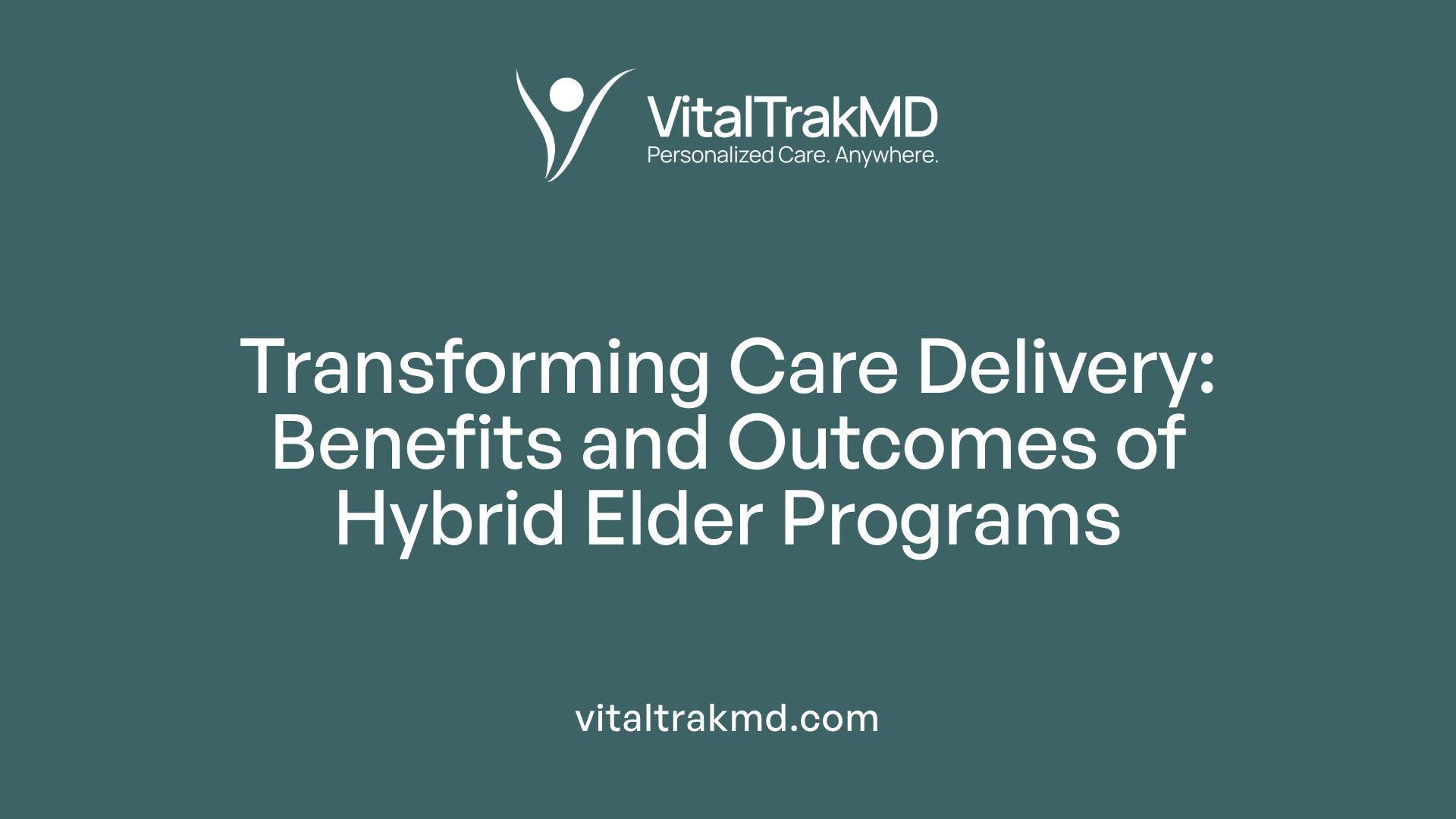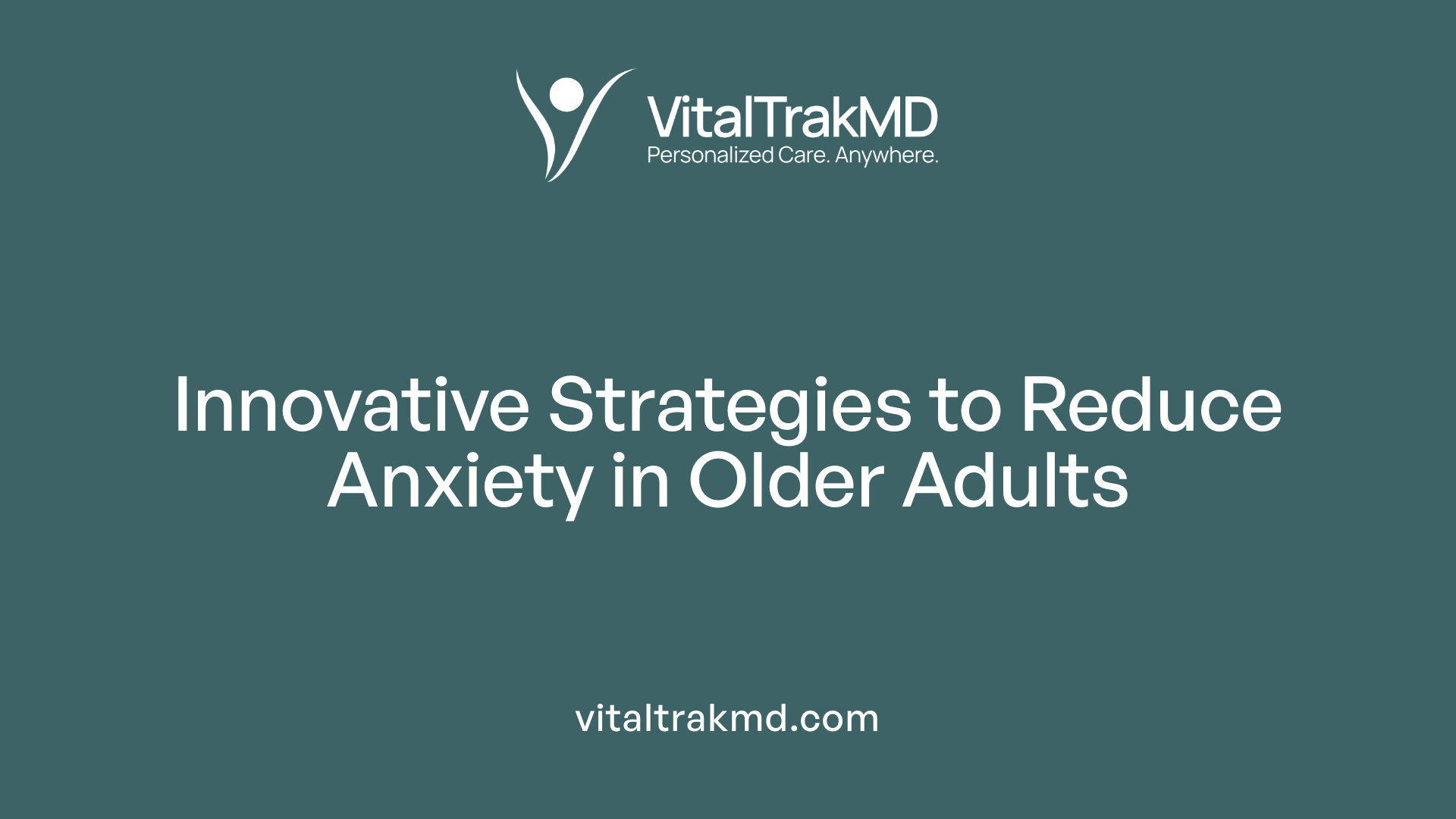How Hybrid Care Reduces Health Anxiety in Older Adults

Understanding the Rise of Hybrid Care in Managing Elderly Mental Health
As the global population ages, addressing health-related anxieties among older adults becomes increasingly vital. Hybrid care models—integrating in-person and remote interventions—offer promising solutions to improve mental health outcomes, particularly in mitigating health anxiety. This article explores how these innovative approaches reduce psychological distress in seniors, examining evidence-based practices, specific interventions, and the mechanisms underpinning their success.
Effectiveness of Hybrid Care in Mental Health Management for Older Adults

How effective are hybrid care models in reducing health anxiety among older adults?
Hybrid care models, which blend various healthcare delivery methods such as telehealth, in-person meetings, community-based programs, and digital interventions, have shown notable promise in managing anxiety-related conditions in older adults. Recent research highlights that these approaches are not only feasible and acceptable but also considerably more effective than standard or usual care.
For instance, targeted interventions like Modular Anxiety Skills Training tailored for Veterans (MAST-V) have demonstrated significant reductions in anxiety symptoms when implemented within primary care settings. Despite being delivered mainly via telephone or video calls—adaptations necessitated by the COVID-19 pandemic—sessions surpassed the targeted 30-minute duration, indicating a strong engagement level and room for structural improvements.
Community-focused programs such as Calmer Life, specifically designed for underserved, predominantly African American elder populations, further illustrate the potential of culturally tailored, community-based hybrid approaches. These interventions incorporate skills training, resource counseling, and religious or spiritual components aligned with participant preferences. Results from randomized controlled trials reveal that participants experienced substantial decreases in worry severity, anxiety symptoms, and loneliness—reinforcing the value of personalized, accessible mental health strategies.
Additionally, digital components like Happify, a well-being platform for adults aged 65 and above, have delivered measurable benefits. Older users engaging at recommended levels—completing activities two or more times weekly—reported significant improvements, including roughly a quarter increase in happiness scores and a similar reduction in anxiety symptoms. Such digital tools bolster the reach and scalability of hybrid care, especially crucial in overcoming barriers like mobility constraints or healthcare disparities.
Notably, some integrated interventions aim to address both psychological and physical health outcomes. Studies indicate that hybrid models combining behavioral therapies and health monitoring can delay the onset of mental health disorders like depression and anxiety, particularly in populations with chronic medical conditions or sensory impairments.
In summary, the accumulating evidence underscores that hybrid care models offer a flexible, culturally sensitive, and effective approach to reducing health anxiety and related symptoms among older adults. By leveraging technology, community resources, and tailored therapeutic techniques, these models improve access to care, promote engagement, and support better mental health outcomes in diverse elder populations.
| Model Type | Delivery Method | Main Outcomes | Population Focus | Additional Notes |
|---|---|---|---|---|
| MAST-V | Telephonic/Video | Significant anxiety reduction | Veterans, primary care | High treatment fidelity, acceptability |
| Calmer Life | Community-based, culturally tailored | Reduced worry, anxiety, loneliness | Underserved, minority elders | Integrates spiritual and social components |
| Happify | Digital platform | Increased happiness, reduced anxiety | Adults ≥65 | Engagement level crucial for benefits |
| Combined Programs | Hybrid (behavioral + health monitoring) | Delayed onset of depression and anxiety | Elderly with chronic conditions | Focus on physical and mental health integration |
These studies collectively point toward a promising future for hybrid elder care models. They demonstrate that when care is adapted to the needs, preferences, and cultural contexts of older adults, it can lead to meaningful improvements in managing anxiety and fostering overall well-being.
Integrating Digital and In-Person Strategies for Mental Well-being

How do hybrid care interventions address issues like anxiety and loneliness in older adults?
Hybrid care interventions combine face-to-face and remote approaches to improve mental health outcomes among older adults, particularly targeting anxiety and loneliness. These strategies integrate in-person interactions with technology-based solutions, creating a flexible and accessible system of support. For instance, reminiscence therapy, mindfulness programs, animal-assisted activities, and cognitive-behavioral therapy (CBT) are adapted for both in-person and virtual delivery. Such activities help reduce feelings of isolation and foster emotional resilience.
Technology plays a crucial role in enhancing social connections. Videoconferencing platforms enable older adults to engage with family, friends, and healthcare providers without needing to leave their homes. Social media and social robots—like companion robots designed for elder care—serve as tools to promote interaction and companionship. These innovations can mitigate feelings of loneliness and provide ongoing emotional support.
However, challenges related to usability and digital literacy can hinder effectiveness. Many older adults may find digital interfaces complex or intimidating, which creates barriers to participation. To overcome this, interventions are tailored to simplify user experiences and include training sessions that improve digital skills.
Multicomponent programs that actively involve older adults in purposeful activities and incorporate community resources tend to be more successful. For example, structured programs might include weekly virtual social events, digital storytelling, and online support groups, complemented by occasional in-person meetings.
Overall, hybrid models provide scalable solutions to address common emotional issues such as anxiety and loneliness. They offer the flexibility to adapt to individual needs and circumstances, making mental health care more accessible. By leveraging technology while preserving the value of face-to-face interactions, these strategies promote social engagement, emotional well-being, and resilience among older populations.
Technologies Supporting Elder Care and Social Engagement
| Technology Type | Main Features | Benefits |
|---|---|---|
| Videoconferencing | Real-time video communication platforms like Zoom or Skype | Enables remote social interaction, teletherapy, and family connectivity |
| Social Media Platforms | Facebook, WhatsApp, specialized elder community forums | Facilitates peer support, information sharing, and social involvement |
| Social Robots | Companionship robots like PARO or ElliQ | Provides emotional comfort, reduces loneliness, supports routine care |
| Mobile Applications | User-friendly apps for health monitoring and engagement | Encourages activity, facilitates communication, promotes independence |
Barriers and Solutions in Digital Elder Care
- Usability: Designing simple, intuitive interfaces tailored for older adults.
- Digital Literacy: Providing training and ongoing support.
- Access: Ensuring affordable devices and reliable internet service.
- Acceptance: Creating awareness and demonstrating benefits to boost engagement.
Summarized Key Topics
| Topic | Description | Impact |
|---|---|---|
| Use of Technology | Videoconferencing, social media, social robots for connection | Enhances social engagement and emotional support |
| Balancing Digital and Face-to-Face | Combining virtual and in-person interactions for optimal care | Addresses diverse preferences and needs |
| Overcoming Barriers | Simplifying interfaces, training, improving access | Ensures wider adoption and effectiveness |
This integrated approach aims to harness the strengths of both digital and traditional methods, ensuring that older adults receive comprehensive, socially engaging, and personalized mental health care. Continued innovations and inclusive practices are vital for overcoming existing barriers and maximizing the benefits of hybrid elder care models.
Benefits and Outcomes of Hybrid Elder Care Programs

What are the benefits and outcomes of hybrid care programs designed for mental health and health anxiety in older populations?
Hybrid care programs, which combine telehealth and in-person services, are transforming mental health care for older adults. These models improve access by offering flexible options tailored to individual needs and preferences, especially important for older individuals who may face mobility or transportation issues. The integration of telepsychiatry and face-to-face sessions ensures continuity of care, which is vital for managing chronic conditions like depression and anxiety.
Research shows that older adults receiving hybrid interventions experience significant improvements in mental health symptoms. For instance, programs addressing depression and health anxiety have demonstrated clinically meaningful reductions in worry, agitation, and overall psychological distress. These outcomes parallel results seen in younger populations, indicating the efficacy of hybrid models across age groups.
Support for culturally diverse populations is a critical aspect of effective hybrid care. Culturally tailored programs, including community-based initiatives like 'Calmer Life', incorporate cultural values, spiritual practices, and language preferences. This personalized approach fosters trust, reduces stigma, and promotes engagement among minority elders, who often face barriers such as healthcare disparities and biases.
In addition, hybrid models help to mitigate social isolation—a significant concern among older adults—by facilitating regular contact and social interaction through digital platforms. This not only improves mood and functional well-being but also strengthens social bonds, which are essential for aging populations.
Implementing these programs also benefits healthcare providers. They can reach more patients, reduce burnout, and manage caseloads more efficiently through remote consultations and digital tools. The use of evidence-based techniques like cognitive-behavioral therapy (CBT), mindfulness, and behavioral activation within hybrid frameworks enhances treatment effectiveness.
Overall, hybrid elder care programs create a comprehensive, accessible, and patient-centered approach to mental health management. They achieve significant clinical improvements, support cultural relevance, reduce stigma, and foster social connectedness, making them a sustainable and scalable solution for age-related mental health challenges.
| Feature | Benefits | Supporting Evidence |
|---|---|---|
| Enhanced Access | Accommodates mobility, transportation, and scheduling needs | Increased engagement, higher satisfaction scores |
| Continuity of Care | Ongoing support regardless of physical barriers | Improved symptom management, reduced relapse |
| Cultural Tailoring | Respects cultural values and preferences | Greater participation among minority elders |
| Social Connectedness | Reduces loneliness and social isolation | Better mood, decreased anxiety scores |
| Provider Efficiency | Extends reach and reduces burnout | Higher caseload management, outpatient retention |
The ongoing shift towards hybrid care emphasizes flexibility and personalization, aligning clinical outcomes with patient experiences. Further research continues to explore optimal implementation strategies, but current evidence underscores its capacity to improve both mental health and overall quality of life for older adults.
Mechanisms and Strategies in Hybrid Interventions to Reduce Anxiety

What strategies and mechanisms do hybrid care programs use to reduce health anxiety in the elderly?
Hybrid care programs employ a blend of remote and face-to-face approaches to effectively lower health anxiety among older adults. These interventions are designed to maintain ongoing engagement, personalize treatment, and address both psychological and physiological aspects of anxiety.
One prominent strategy is incorporating physical activity into treatment plans. Exercise has been well-documented to decrease anxiety symptoms by releasing endorphins, improving overall cardiovascular health, and reducing stress levels. Activities such as gentle yoga, walking, or tailored strength exercises can be adapted for seniors, providing both physical benefits and psychological reassurance.
Social support networks play a crucial role in reducing feelings of loneliness and fostering resilience. Group activities, community engagement, or virtual social interactions help create a sense of belonging, mitigating the social isolation that often exacerbates anxiety. Programs like group exercises or community-based discussions also serve as emotional outlets and sources of encouragement.
Another vital component is the use of collaborative and multidisciplinary care models. Telepsychiatry, digital health platforms, and integrated primary care teams enable comprehensive management of mental and physical health issues. These coordinated efforts ensure timely intervention, monitor progress, and adapt treatments dynamically to meet individual needs.
Targeted psychosocial interventions are central to these strategies. Techniques such as cognitive-behavioral therapy (CBT), mindfulness practices, and health education empower older adults with skills to manage worry and fear effectively. These interventions often include addressing social determinants like stigma, health literacy, and social support, which influence anxiety levels.
Collectively, these mechanisms harness the synergy of physical health promotion, social connectivity, specialized care, and psychological support. This integrated approach not only alleviates existing anxiety symptoms but also builds resilience against future stressors, ultimately enhancing the quality of life for elderly populations.
| Strategy/Mechanism | Description | Impact |
|---|---|---|
| Physical Activity | Incorporation of tailored exercises to reduce physiological stress | Decreases anxiety, improves mood, enhances physical health |
| Social Support Networks | Engagement through group activities, community programs, or virtual groups | Reduces loneliness, fosters resilience, provides emotional safety |
| Collaborative Care Models | Use of multidisciplinary teams, telepsychiatry, digital platforms | Ensures comprehensive, accessible, and personalized care |
| Psychosocial Interventions | Techniques like CBT, mindfulness, health education | Empowers self-management, reduces worry, enhances coping skills |
Understanding these strategies is essential for developing effective interventions aimed at alleviating health anxiety among older adults. Future efforts should continue to refine these approaches, emphasizing accessibility and cultural relevance, to maximize benefits across diverse elderly populations.
Role of Hybrid Care in Supporting Elder Resilience During Crises

How do hybrid or remote care models help address mental health issues such as anxiety in older adults during health crises?
Hybrid and remote care models are increasingly vital tools in managing mental health among older populations, especially during times of widespread health crises like pandemics. These models utilize telemedicine and digital communication platforms to provide accessible, flexible, and tailored support, overcoming common barriers such as mobility restrictions and limited healthcare access.
By facilitating comprehensive assessments, these approaches enable healthcare providers to closely monitor symptoms of anxiety, depression, and other mental health conditions. Multidisciplinary teams can collaborate efficiently, ensuring that interventions are personalized to each individual's needs, health status, and social context.
Proactive outreach and continuous monitoring are central features of hybrid care, allowing clinicians to identify early signs of distress and intervene promptly. This ongoing engagement helps prevent the escalation of anxiety by addressing concerns before they become severe.
Community engagement plays a crucial role, with programs designed to incorporate social support systems, reduce loneliness, and combat stigma. Group virtual sessions, peer support mechanisms, and family involvement contribute to a sense of connectedness, which is essential for resilience.
Technology also extends the reach of mental health services into underserved or remote areas. Telepsychiatry, electronic health records, mobile apps, and online support groups facilitate intervention delivery and adherence to treatment plans, ensuring that older adults receive consistent care regardless of geographical or physical limitations.
Furthermore, integrating social support with clinical care—such as embedding mental health check-ins into routine medical visits—creates a holistic approach that enhances treatment effectiveness. Family-centered care models emphasize involving relatives in treatment plans, fostering understanding and active participation.
Community-based programs and digital innovations foster social connectedness and a sense of belonging, which are pivotal in managing anxiety. They also help diminish feelings of isolation that can intensify during crises.
In summary, hybrid and remote care models bolster mental health support for older adults by offering accessible, continuous, and personalized care. They facilitate early detection, promote social engagement, and leverage technology to overcome physical and systemic barriers, ultimately enhancing resilience amid challenging circumstances.
Empirical Evidence and Systematic Support for Hybrid Care Approaches
What evidence supports the use of hybrid care approaches for mental health improvement in aging populations?
Research studies and pilot trials have provided promising evidence for hybrid care strategies that integrate remote and in-person services to improve mental health among older adults. For instance, pilot studies evaluating tailored interventions like Modular Anxiety Skills Training (MAST-V) for Veterans in primary care settings demonstrated that telehealth modalities—especially telephone and video sessions—are feasible, acceptable, and effective. Participants reported high satisfaction levels, and therapists achieved strong fidelity to intervention protocols, which translated into significant reductions in anxiety symptoms and impairment.
Further, a small-scale randomized controlled trial (RCT) with elderly participants acquainted improvements in anxiety and loneliness after participating in reminiscence-based digital interventions, such as the 'Journey of Memories' game. Participants found these interventions usable and engaging, with benefits extending to mental health and social connectedness. While these trials yielded positive outcomes, they also highlighted logistical limitations, such as the need for more refined session structuring.
Systematic reviews and meta-analyses further support the effectiveness of hybrid models. Studies examining low-intensity psychological interventions—such as bibliotherapy, internet-based programs, and brief therapist-supported videos—found moderate to large effect sizes in reducing depression and anxiety symptoms among older adults. These interventions often lasted between 3 to 6 months, with some extending up to three years. Although the evidence indicates positive psychiatric outcomes, impacts on physical health or healthcare utilization were limited or mixed.
A review of digital well-being tools like Happify revealed that consistent engagement correlates with improvements in mood and reduction of anxiety, thereby emphasizing the role of sustained digital interactions in mental health care. Additionally, collaborative community-academic partnerships and strategies like training nontraditional providers have been shown to enhance accessibility and cultural relevance, especially among underserved minority groups.
Limitations and research gaps
Despite encouraging evidence, current research faces several limitations. Many pilot studies are conducted at single sites with small, homogeneous samples—often predominantly male, White, or from specific geographic regions—limiting generalizability. There is a notable paucity of large-scale, diversity-focused trials that include varied racial, ethnic, and socioeconomic groups.
Furthermore, while short-term benefits of digital and remote interventions are evident, long-term effects on both psychiatric and medical outcomes remain uncertain. Most interventions lack integration across healthcare systems, and there is insufficient evidence on optimal duration and intensity needed for sustained benefits.
The variability in intervention delivery methods, technological platforms, and therapeutic frameworks creates challenges for consistency and scalability. Additionally, the digital divide—particularly among older, socioeconomically disadvantaged, or minority elders—remains a barrier, hindering equitable implementation.
Finally, further research is necessary to explore how hybrid models can be tailored to address specific needs such as trauma, cognitive decline, and comorbid medical conditions more effectively. More comprehensive studies examining cost-effectiveness, workforce training adaptations, and user engagement factors are also needed for widespread adoption.
| Study Type | Sample Size | Population Focus | Outcomes Measured | Main Findings | Limitations |
|---|---|---|---|---|---|
| Pilot trial | 35 Veterans | Predominantly male, White | Anxiety severity, satisfaction | MAST-V reduced anxiety, high satisfaction | Single site, small sample |
| RCT | 38 elderly | Age 61–75 | Anxiety, loneliness | Significant reduction in anxiety and loneliness | Short follow-up, limited diversity |
| Meta-analysis | 20+ studies | Older adults 65+ | Depression and anxiety | Moderate to large effect sizes | Heterogeneous interventions |
| Digital well-being | 375 older adults | ≥65 years | Well-being, anxiety | Engagement linked to improved mental health | Digital divide barriers |
What future directions are suggested?
To advance hybrid care strategies, further large-scale, diverse, and longitudinal research is crucial. Developing standardized frameworks, improving technology accessibility, and fostering community collaborations can help optimize outcomes. Emphasizing patient-centered approaches and integrating multidisciplinary teams may enhance personalization and engagement across different elder populations. Ultimately, a strengthened evidence base will support policy development and widespread adoption of effective hybrid mental health care models for aging communities.
Conclusion: The Future of Elder Care in a Hybrid World
Are there systematic reviews or evidence-based practices supporting the impact of hybrid care on health anxiety in older adults?
Current research and systematic reviews mainly examine hybrid care models' effects on depression and other psychiatric disorders among older adults. Evidence supporting the specific impact on health anxiety remains limited. Existing reviews suggest that combining telehealth and in-person treatments can improve symptoms of depression, with some studies reporting modest or inconsistent results.
However, there is a significant research gap when it comes to health anxiety. Few studies have directly assessed how hybrid care affects this condition, which is prevalent but often underdiagnosed in older populations. Implementation factors such as the need for trained staff, organizational support, and availability of resources play a critical role in success.
Barriers to adopting hybrid models include funding issues and resistance within healthcare systems. Although the evidence for hybrid approaches broadly indicates potential benefits for mental health, the specific impact on health anxiety in seniors lacks robust, targeted data.
In conclusion, while hybrid care approaches show promise for managing psychiatric disorders among elders, more dedicated research is required. This will clarify their effectiveness for health anxiety and guide development of evidence-based practices tailored to the needs of older adults.
Towards sustainable and scalable interventions
Developing interventions that are both sustainable and scalable depends on integrating technological solutions with community resources. Digital platforms, such as internet-based CBT and mobile health apps, have demonstrated efficacy in reducing anxiety and depression among older adults and can be expanded with minimal physical infrastructure.
Scalability benefits from adaptable programs that require low-intensity training for providers and can be delivered remotely. For example, brief clinician-guided internet interventions or self-help modules can be disseminated widely, especially in underserved areas.
However, ensuring accessibility for older adults, particularly those with physical, sensory, or cognitive impairments, is crucial. Designing user-friendly interfaces and providing technical support are vital steps for scaling such interventions.
Policy implications for future elder care
Policy frameworks should promote integration of hybrid care models within primary healthcare systems. Policies that support telehealth reimbursement, licensure portability, and cross-sector collaboration are essential.
In addition, policies geared towards reducing disparities in access to mental health care for minority and rural populations are imperative. Culturally tailored interventions, such as the 'Calmer Life' program, exemplify practices that can be scaled with appropriate policy support.
Funding mechanisms must prioritize evidence-based digital interventions and capacity-building initiatives to train healthcare providers in delivering hybrid care.
Training and capacity building
Healthcare providers need specialized training to deliver hybrid interventions effectively. This includes digital literacy, culturally sensitive communication, and adaptations for older adults' physical and cognitive limitations.
Capacity-building programs should include modules on motivational interviewing, behavioral activation, mindfulness, and other evidence-based techniques suitable for remote delivery.
Creating a workforce comfortable with technology and equipped to address diverse needs will be critical for successful implementation.
Research priorities for the future
Future studies should aim to fill the evidence gap regarding hybrid care's impact on specific conditions like health anxiety. Large-scale, randomized controlled trials examining long-term outcomes are necessary.
Research should also focus on identifying barriers and facilitators to implementation in diverse populations, including minority elders.
Moreover, evaluating cost-effectiveness, user engagement strategies, and the integration of community and healthcare systems will inform scalable solutions.
In sum, advancing elder care in a hybrid context requires a multifaceted approach, combining evidence-based interventions, supportive policies, comprehensive training, and dedicated research efforts. Prioritizing these areas will help develop sustainable, accessible, and effective mental health services for older adults in the years ahead.
Harnessing the Potential of Hybrid Care for Better Elderly Mental Health Outcomes
The integration of hybrid care models—combining telehealth, community engagement, and personalized interventions—stands out as a promising approach to reduce health anxiety and improve mental health among older adults. Evidence from pilot studies, clinical trials, and systematic reviews underscores their feasibility, acceptability, and effectiveness. These models enhance access, promote social support, and enable tailored treatments that meet the unique needs of diverse elderly populations. To maximize their potential, ongoing research should address existing gaps, and healthcare policies need to support resource allocation, workforce training, and technological innovation. As elder care continues to evolve, hybrid models will likely become the cornerstone of sustainable, comprehensive mental health strategies, fostering resilience and well-being in aging communities.
References
- Brief Modular Anxiety Intervention for Primary Care: Hybrid I Pilot ...
- The Effect of a Reminiscence Therapy-Based Hybrid Board Game ...
- Calmer Life: A Hybrid Effectiveness-implementation Trial for Late-life ...
- Remote Care Management for Older Adult Populations With ...
- Older adults' prevention and communication to beat anxiety
- Effects of Mindfulness-Based Elder Care (MBEC) on symptoms of ...
- Efficacy of low intensity interventions for geriatric depression and ...
- The Effects of a Digital Well-being Intervention on Older Adults
- Stepped care for depression and anxiety in visually impaired older ...
- Effects of a health-seeking behavior education program based on ...
Recent articles
Want to Feel Better and Live Healthier?
Join hundreds of patients taking control of their health with personalized care that fits their life – not the other way around.
Rated 4.8/5 by 32+ customers







